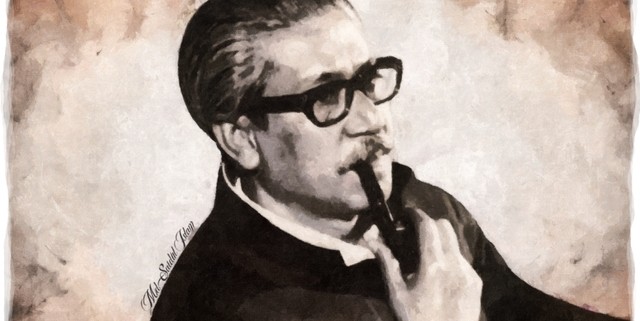A Brief
Bangabandhu Sheikh Mujib was born on March 17, 1920 and was assassinated by a group of junior army officers on August 15, 1975 – coincidentally on India’s Independence Day.
Sheikh Mujib headed the Awami League, served as the first President of Bangladesh and later became its Prime Minister. His eldest daughter Sheikh Hasina Wajed is the present leader of the Awami League and the current Prime Minister of Bangladesh.
Mujib was born in Tungipara, a village in Gopalganj District in the province of Bengal to Sheikh Lutfar Rahman, a serestadar, and an officer responsible for record keeping at the Gopalganj civil court. He was the third child in a family of four daughters and two sons. In 1929, Rahman entered into class three at Gopalganj Public School, and two years later, class four at Madaripur Islamia High School.
However, Mujib was withdrawn from school in 1934 in order to undergo eye surgery, and returned to school only after four years, owing to the severity of the surgery and slow recovery. At the age of eighteen, Mujib married Begum Fazilatnnesa. She gave birth to their two daughters-Sheikh Hasina and Sheikh Rehana-and three sons-Sheikh Kamal, Sheikh Jamal and Sheikh Russel.
Mujib became politically active when he joined the All India Muslim Students Federation in 1940. He enrolled at the Islamia College (now Maulana Azad College), a well-respected college affiliated to the University of Calcutta to study law and entered student politics there.
He joined the Bengal Muslim League in 1943 and grew close to the faction led by Hussein Shaheed Suhrawardy, a leading Bengali Muslim leader. During this period, Mujib worked actively for the League’s cause of a separate Muslim state of Pakistan and in 1946 he was elected general secretary of the Islamia College Students Union.
After obtaining his degree in 1947, Mujib was one of the Muslim politicians working under Suhrawardy during the communal violence that broke out in Calcutta, in 1946, just before the partition of India.
Mujib, a student leader in 1949 On his return to East Bengal, he enrolled in the University of Dhaka to study law and founded the East Pakistan Muslim Students’ League and became one of the most prominent student political leaders in the province.
Mujib launched his political career, leaving the Muslim League to join Suhrawardy and Maulana Bhashani in the formation of the Awami Muslim League, the predecessor of the Awami League. He was elected joint secretary of its East Pakistan unit in 1949.
In 1953, he was made the party’s general secretary, and elected to the East Bengal Legislative Assembly on a United Front coalition ticket in 1954. He was elected to the second Constituent Assembly of Pakistan and served from 1955 to 1958.
In 1956, Mujib entered a second coalition government as minister of industries, commerce, labour, anti-corruption and village aid, but resigned in 1957 to work full-time for the party organization
Following Suhrawardy’s death in 1963, Mujib came to head the Awami League, which became one of the largest political parties in East Pakistan.The party had dropped the word “Muslim” from its name in a shift towards secularism. Mujib supported opposition candidate Fatima Jinnah against Ayub Khan in the 1964 election.
Following Indian intervention in December 1971, the League leadership created a government in Dhaka. Mujibur Rahman briefly assumed the provisional presidency and later took office as the Prime Minister, heading all organs of government and decision-making.
He charged the provisional parliament to write a new constitution, and proclaimed the four fundamental principles of “nationalism, secularism, democracy and socialism,” which would come to be known as “Mujibism”.
In 1974, Bangladesh experienced the deadliest famine ever, which killed around 1.5 million Bangladeshi people from hunger. The Bangladesh famine of 1974 is a major source of discontent against Mujib’s government.
Sheikh Mujib’s government soon began encountering increased dissatisfaction and unrest. His programs of nationalization and industrial socialism suffered from lack of trained personnel, inefficiency, rampant corruption and poor leadership. Mujib’s ambitious social programs performed poorly, owing to scarcity of resources, funds and personnel, and caused unrest amongst the masses.
Political unrest gave rise to increasing violence, and in response, Mujib began increasing his powers. On January 25, 1975 Mujib declared a state of emergency and his political supporters approved a constitutional amendment banning all opposition political parties.
Mujib was declared “president for life,” and given extraordinary powers. His political supporters amalgamated to form the only legalized political party, the Bangladesh Krishak Sramik Awami League, commonly known by its initials-BAKSAL
On August 15, 1975, a group of junior army officers invaded the presidential residence with tanks and killed Mujib, his family and personal staff. Only his daughters Sheikh Hasina Wajed and Sheikh Rehana, who were visiting West Germany, escaped. They were banned from returning to Bangladesh.
During his tenure as Bangladesh’s leader, Muslim religious leaders and politicians intensely criticized Mujib’s adoption of state secularism. He alienated some segments of nationalists and the military, which feared Bangladesh, would come to depend upon India.
Mujib’s imposition of one-party rule and suppression of political opposition alienated large segments of the population and derailed Bangladesh’s experiment with democracy for many decades.
Following his death, succeeding governments offered low-key commemorations of Mujib, and his public image was restored only with the election of an Awami League government led by his daughter Sheikh Hasina in 1996. Mainly Awami League supporters commemorate August 15 as “National Mourning Day.”
PS: Mark Tully took the painting gift from Mujib with him to London. The painting was done by artist Muzimul Azim, in 1973. When asked how he managed that, Tully quipped with a child like smile as he would cherish the memory of the late Bangladesh leader for long time, “I simply took it from the office.”











Leave a Reply
Want to join the discussion?Feel free to contribute!